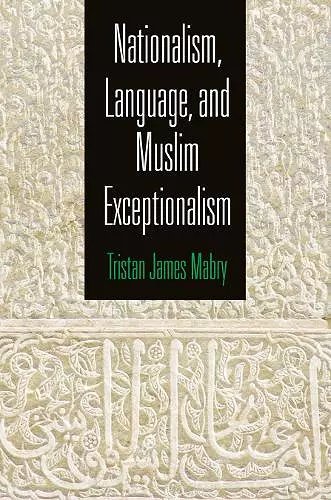Nationalism, Language, and Muslim Exceptionalism
Format:Hardback
Publisher:University of Pennsylvania Press
Published:25th Mar '15
Currently unavailable, and unfortunately no date known when it will be back

Drawing on fieldwork in Iraq, Pakistan, India, Indonesia, and the Philippines, Nationalism, Language, and Muslim Exceptionalism compares the politics of six Muslim separatist movements, locating shared language and print culture as a central factor in Muslim ethnonational identity.
In an era of ethnopolitical conflict and constitutional change worldwide, nationalist and Islamist movements are two of the most powerful forces in global politics. However, the respective roles played by nationalism and Islamism in Muslim separatist movements have until recently been poorly understood. The conventional view foregrounds Muslim exceptionalism, which suggests that allegiance to the nation of Islam trumps ethnic or national identity. But, as Tristan James Mabry shows, language can be a far more reliable indicator of a Muslim community's commitment to nationalist or Islamist struggles.
Drawing on fieldwork in Iraq, Pakistan, India, Indonesia, and the Philippines, Nationalism, Language, and Muslim Exceptionalism examines and compares the ethnopolitical identity of six Muslim separatist movements. There are variations in secularism and ethnonationalism among the cases, but the key factor is the presence or absence of a vernacular print culture—a social cement that binds a literate population together as a national group. Mabry shows that a strong print culture correlates with a strong ethnonational identity, and a strong ethnonational identity correlates with a conspicuous absence of Islamism. Thus, Islamism functions less as an incitement, more as an opportunistic pull with greater influence when citizens do not have a strong ethnonational bond. An innovative perspective firmly grounded in empirical research, Nationalism, Language, and Muslim Exceptionalism has important implications for scholars and policymakers alike.
"An entirely original and important contribution to the study of nationalism, this book brings together a broad range of ideas about ethnicity, language, and religion and deftly weaves together an elegant theory that not only explains why some Muslim societies choose to turn toward or away from fundamentalism but what to do about it." * John A. Hall, James McGill Professor in Sociology, McGill University *
ISBN: 9780812246919
Dimensions: unknown
Weight: unknown
264 pages